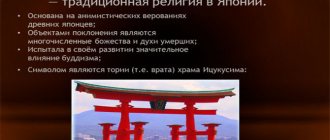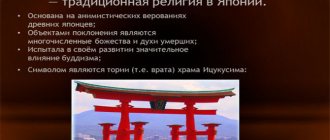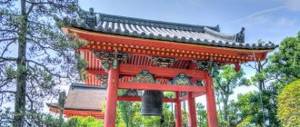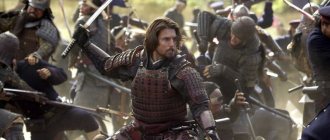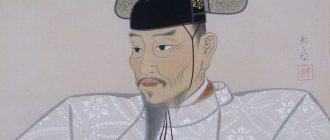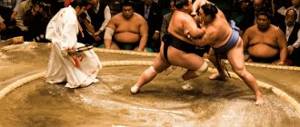Bushido on Igor Garshin's website.
Military codes. Traditions of honor. Examples of warrior spirit Home
| Write |
Home > Esoterics > Psychology > Military ethics
Alphabetical list of pages: | | | | | E (Yo) | | | | | | | | | | | | | | | | | | | | | | | | 0-9 | AZ (English)
| The Path of the Warrior is a decisive, final and absolute acceptance of death. It means the desire for death whenever there is a choice between life and death. (Miyamoto Musashi) Life belongs only to those who are not afraid to lose it. |
Martial art is a way of life, a special view of the surrounding reality. The first task of any martial art is to educate a spiritual person, to create a rich inner world. Only through achieving inner harmony can a person direct his life energy to achieve his goal.
- First of all, a warrior knows how to control himself, his emotions and desires, intentions and actions.
- A warrior is always responsible for his decisions and actions. Impatience, searching for easy ways, achieving a goal at any cost are not characteristic of a warrior. The first and most difficult victory that a future warrior must win is victory over himself.
- Physical strength is not the main characteristic of a warrior; age and health have no power over his spiritual state [like Jesus Christ].
- The warrior is no stranger to the feeling of fear, however, he enjoys his ability to channel this feeling in the right direction, his ability to mobilize all the resources of his body to solve the task at hand.
- A warrior is primarily concerned with the appropriateness of using brute force, and then with the method of using this force. A realistic assessment of one's abilities, which are significantly higher than those of the average person, allows a warrior to calmly assess the situation and make the right decisions in critical situations. The ability to use brute force is combined with the desire to avoid such use.
- A warrior knows how to use any situation for his own purposes and come out of a fight as a winner even in losing situations. Any defeat for a warrior is another step towards his goal - gaining experience, assessing the enemy, temporarily calming the enemy. Despite the optional physical superiority over the enemy, a warrior cannot be weak to win. Only by surpassing the enemy in one of several components: skill, cunning, dexterity, endurance and, finally, simply the desire to win, can a warrior win.
- A warrior cannot be weak; victory over an enemy is possible only in case of superiority in any combat skills, superiority that can compensate for weaknesses in other areas of martial arts.
- The whole life of a warrior consists of struggle and self-improvement. Occupation is not the main sign of a warrior.
- A warrior is a personality type, a way of life, a way of interacting with the surrounding reality. A warrior does not necessarily have to practice martial arts, but it is among people involved in martial arts that this type of personality can most often be found, since martial arts contribute to the development of the qualities inherent in a warrior.
Page sections:
- Bushido - the way of the samurai
- Russian officer's code of honor
- Examples of warrior spirit
- Traditions of honor
- The world of Carlos Castaneda
Bushido - the way of the samurai
They say that Moses also had the 11th commandment: “Do not be afraid!” This is bushido. The best thing about valor is prudence. W.Shakespeare
War is a game in which sometimes the best men fail.
M. Kemal Ataturk
No one can be completely free until everyone is free.
No one can be completely moral until everyone is still moral. No one can be completely happy until everyone is still happy. G. Spencer.
Morality teaches not how to become happy, but how to become worthy of happiness.
Kant.
Samurai Code Trilogy
First book - Hagakure
(“Hidden in the Leaves”) - expresses a fundamental and in some respects even extreme point of view about the Way of the Warrior.
The second, “Ideals of the Samurai,”
contains statements and writings by the warriors themselves on issues that sometimes differ from each other like day and night, covering a period of 400 years.
And finally, Budoshoshinshu
(the code of the samurai) is a book that can be considered canonical in its way of thinking and which was the most popular among the military class in the last era of the reign of the shoguns in Japan.
- Hagakure - Hidden in the leaves (analysis and excerpts - from the site Aikidoka.ru)
- Hagakure (Book of the Samurai). Excerpts.
- Samurai ideals.
- Instructions for those entering the Path of the Warrior (“Budoshoshinshu”) Copy on the Shodokan Aikido website
Other texts about Bushido
I have no miracles: I did the right thing by miracle... (Creed of the unknown samurai)
- Samurai of the 20th century (on the Shin Shin Toitsu website) - a lot of interesting things about strategy, bushido, zen, fencing...
- The teachings of the Tenshin Shoden Katori Shinto-ryu school. translation by A. Gorbylev. From the website of the Moscow dojo Katori Shinto-ryu
- Warrior's Creed
Confucianism - the morality of man, sage, commander, ruler
Having learned the truth in the morning, you can die in the evening. It is better to light one small candle than to curse the darkness. A worthy person cannot but possess a breadth of knowledge and fortitude. His burden is heavy and his path is long. Confucius
- Confucius. Conversations and judgments.
- Confucius. Lun-Yu. (the same)
Ethics
Bushido was a strict code that demanded loyalty, devotion and honor until death. In bushido, if a samurai failed to defend his honor, he could regain it by committing seppuku (ritual suicide).
Bushido is based on the following principles:
- Loyalty and devotion (忠義【ちゅうぎ】chūgi): to one's feudal master.
- Morality and integrity (義【ぎ】gi)
- Honor (名誉【めいよ】meiyo)
- Respect and Gratitude (礼【れい】rei)
- Honesty and Loyalty (誠(P); 実【まこと】Makoto)
- Courage and Courage (勇【ゆう】yū)
- Friendliness and Humanity (仁【じん (P); にん】yū)
- Filial Piety (孝【こう; きょう】kō, kyō)
- Respect for the Elderly (悌【てい】tei)
- Wisdom (知; 智【ち】chi)
Knights and Samurai: Comparison of Feudal Structures in Japan and Europe
The first seven principles form the basis of the Japanese warrior code, and the other three can be considered as related virtues. In general, they are akin to the concept of chivalry in medieval Europe. The idea of bushido was first mentioned in 8th-century literature and became widespread as a philosophical concept during the Kamakura and Muromachi periods (11th to 16th centuries), when the basic conduct of a warrior was called "the way of the horse and the bow" (弓馬の道 kyūba no michi). The warrior ideal was embodied in the poetry and literature of the period, such as the Haike Monogatari, which depicts the Genpei War (源平合戦 Genpei Kassen) between the Minamoto (源) and Taira (平氏) clans.
Russian officer's code of honor
Code of Honor of the Russian Officer (1904):
- Don't make promises unless you're sure you'll keep your promise.
- Conduct yourself simply, with dignity, without foppishness.
- It is necessary to remember the line where dignified politeness ends and servility begins.
- Do not write rash letters and reports in the heat of the moment.
- Be less frank - you will regret it. Remember: my tongue is my enemy!
- Don’t play around - you won’t be able to prove your valor, but you will compromise yourself.
- Don’t rush to get on friendly terms with a person you haven’t gotten to know well enough.
- Avoid money accounts with your friends. Money always spoils relationships.
- Do not take personally offensive remarks, witticisms, or ridicule said after you, which often happens on the streets and in public places. Be above it. Leave - you won’t lose, but you’ll get rid of the scandal.
- If you can’t say anything good about someone, then refrain from saying anything bad, even if you know.
- Don't ignore anyone's advice - listen. The right to follow it or not will remain yours. Knowing how to take good advice from another is no less an art than giving good advice to yourself.
- The strength of an officer does not lie in impulses, but in unshakable calm.
- Take care of the reputation of the woman who trusted you, no matter who she is.
- There are situations in life when you need to silence your heart and live with your mind.
- A secret that you tell to at least one person ceases to be a secret.
- Always be alert and don't let yourself go.
- Try to keep your words soft and your arguments firm in a dispute. Try not to annoy your opponent, but to convince him.
- It is not customary for officers to dance at public masquerades.
- When speaking, avoid gesturing and raising your voice.
- If you have entered a society in whose midst there is a person with whom you are in a quarrel, then, when greeting everyone, it is customary to shake hands with him, of course, if this cannot be avoided without drawing the attention of those present or the hosts. Giving a hand does not give rise to unnecessary conversations, and does not oblige you to anything.
- Nothing teaches you more than realizing your mistake. This is one of the main means of self-education. Only those who do nothing make no mistakes.
- When two people quarrel, both are always to blame.
- Authority is acquired by knowledge of business and service. It is important that your subordinates respect you, not fear you. Where there is fear, there is no love, but there is hidden ill will or hatred.
- There is nothing worse than indecision. A worse decision is better than hesitation or inaction. You can't get back a lost moment.
- The one who fears nothing is more powerful than the one whom everyone fears.
- The soul is for God, the heart is for a woman, duty is for the Fatherland, honor is for no one.
This is a code of honor in everyday life. There were also rules of conduct in war. For example, naval officers did not give up, preferring to die with the ship they sank, releasing the sailors on boats (described by Pikul in “Moozund”).
Code of Samurai Honor "Bushido".
In order to understand that there is a code of honor “Bushido”, it is necessary to give a translation of the hieroglyphs that make up the word “Bu”, “Si” and “Do”. The Japanese adopted Chinese hieroglyphic writing, and the answer lies in the ancient meaning of these characters. "Boo" - denotes the ability to subdue a weapon, "stop a spear" and prohibits violence. “Si” means “warrior”, “noble person”, striving for knowledge - “scientist”. Originally in China, this word denoted people who had mastery in a certain field and occupied their position in society thanks to their learning. However, such scientists were ready to take up arms when necessary. “Before” - “The Path”, a set of life rules and guidelines, philosophy and meaning of life. Thus, a “bushi” is a person capable of maintaining peace, both through art and military means. The ideal of a highly educated warrior, capable of achieving perfection, both in literature and art, and in military affairs. Being merged with Eastern philosophy (Buddhism, Tao-Zen, Shintoism, Confucianism, the works of the invincible strategist Sun Tzu), Bushido had the character of practical moral teaching. The samurai considered it a method of improving mental and physical hygiene, a moral and philosophical world doctrine designed to teach the samurai “correct life” in society. Bushido combined the theory of existence, the study of the human psyche, and resolved issues related to the concept of the essence of the individual, his role in the world around him, the meaning of life, good and evil, moral values and the moral ideal. A warrior brought up in the spirit of bushido must be clearly aware of his moral duty, must evaluate his actions and deeds himself, morally condemn and punish himself in case of wrong actions, violation of his duties and duty (“giri”). Bushido was based on the power of persuasion, public opinion, example, education, tradition, and the strength of the moral authority of individuals noted in Japanese history. So, bushido is a special morality developed by the class of warriors who were part of the ruling class of Japan, which was a system of views, norms and assessments regarding the behavior of samurai, ways of educating samurai youth, creating and strengthening certain moral qualities and relationships. In the Middle Ages, the main thing in bushido was loyalty to the overlord, with whom the bushi was in a relationship of patronage and service, and the honor of weapons, which was the privilege of a professional warrior. With the advent of capitalist relations in Japan and the abolition of the samurai class, loyalty to the master was replaced by loyalty to the Emperor and the Motherland, the honor of weapons was replaced by high professional skill. The Busi led a professional army and navy, became scientists, teachers, artists and poets, and managers of capitalist enterprises. 2 Principles of bushido: - modesty; - politeness, implying patience, absence of envy and evil; - the ability to control oneself and manage one’s feelings, which was brought to perfection by the bushi. Peace of mind was considered the ideal of Bushido. - a sense of honor, a sense of self-worth, was cultivated among samurai from childhood. Raising your voice at a child or adult was considered a “loss of face,” a shame, a sign of weakness. Honor and glory were valued more than life, therefore, when one of these concepts was at stake, the samurai, without hesitation, gave his life for it. When a samurai was faced with a choice: life or death, he always chose death, and, often, remained alive. — a lie for a samurai was tantamount to cowardice. The samurai's word carried weight without any written obligations, which, in his opinion, humiliated his dignity. — love of weapons and martial arts, sense of responsibility. The indiscriminate use of military skill was considered dishonorable. They were instructed to use their skills only in cases of extreme necessity, and in other cases they used the power of their gaze and words. “The best fight is the one that did not take place, where victory was achieved without a fight” Sun Tzu. - samurai believed in their divine predestination, making their will completely dependent on the will of the gods; - veneration of deceased ancestors and worship of the souls of warriors and military leaders killed in battle, deified heroes and emperors” - veneration of elders; - respectful attitude towards wife and children; - condemnation of gossip and any conversations behind the scenes. To a friend or loved one, the bushi is obliged to point out the offense, but to do so as a hint so as not to offend. — meditation — immersion in silent contemplation in the “zazen” position (sitting on the heels), mastering external and spiritual forces to achieve enlightenment, finding answers in difficult life situations; - persistent education of the will, attention to self-control and mental balance, composure. — constant work on oneself, self-education, the ability to extract the essence from any problem and focus on it. No matter what, go towards your goal. Development of science and related military technology, metallurgy and mining, etc. expanded the bushi's range of interests. The will to win is not enough; knowledge based on books and logical thinking are required. The dogmas of "Zen" changed in accordance with the spirit of the era. Below are the most significant instructions of medieval masters included in Bushido. 3 The Bushido Code begins with the sayings of Yamomoto Tsunetomo “Hidden in the Leaves.” The author of this “holy scripture” for Japanese warriors was a samurai, served the ruler of the province for 10 years, and after his death, became a Buddhist priest. What does this name mean? Taoists (Zen in Japan) revere the “Tree of Knowledge.” They take care of it, admire the beauty of its carved leaves, listen to their whispers, and take their time to pick the fruits. This is the ancestor of Western culture, Eve, who picked a fruit from this tree, approaching it for the first time, and ate it right away along with Adam. And knowledge did not benefit humanity. Translations by A. Bochenkov and V. Gorbatko. Yamomoto Tsunetomo. "Hagakure" ("Hidden in the Leaves"). 1716 “A man’s life is short, but his name is eternal.” “The way of the samurai is found in death. When there are two paths to choose from, there is only a quick and decisive way out - death. Be strong in your resolve and move forward. To die without achieving a goal is truly fanaticism. But there is no dishonor in this. But not achieving your goal, giving up and continuing to live is cowardice. If you strengthen your heart with determination every morning and every evening, the path will be clear for it. His whole life will be impeccable, and he will achieve success in his field.” “I don’t know a way to defeat others, but only a way to defeat myself. Throughout your life, move forward every day, becoming more skilled than yesterday, more skilled than today. This Path never ends." “Victory or defeat is a matter of temporary circumstances. To avoid shame, you need to choose a different path - death. A real man doesn't think about winning or losing. He rushes forward recklessly - towards death." "The samurai is admired precisely because he has good manners. It's hard to find a role model. Therefore, it would be good to create such an image and learn from it. You should look at different people and take from each person only his best quality. One has politeness, another has courage, a third has the correct manner of conversation, a fourth has correct behavior and manners, and a fifth has poise.” “By treating people rudely, you become like lackeys.” “If we rejected anyone who once made a mistake, we would probably have no useful people left at all. A person who has once stumbled will behave much more prudently and benefit because he has experienced repentance. A man who has never made a mistake is dangerous.” “Generosity is compassion. The one who has sinned should be pitied even more. Everything you do must be done for the sake of the master, parents, all humanity and descendants. This is great compassion. True wisdom and courage come from compassion. 4 When a person punishes someone or strives for something with compassion in his heart, then whatever he does will be right and have unlimited power.” “Self-seeking actions are petty and undignified and turn into evil for a person.” “When the moment comes, there is no time to think. And if you haven’t found out everything in advance and made a decision, most often you will face disgrace. Reading books and talking to people is necessary in order to prepare in advance for possible developments of events.” “It is known that fish will not live in water that is too clear. But if the surface of the water is covered with duckweed or other similar plants, then the reservoir will abound in fish, which can hide in their shadow. Likewise, the lower classes will live in serenity if some things are looked at through fingers and deaf ears." "In order for peace and harmony to reign in the country, the country must be governed from a position of compassion, for when a person thinks about the people , as their children, the people think of him as their parent.” “The merits and demerits of ancestors can be judged by the behavior of their descendants. A person should act in such a way that the good qualities of his ancestor appear, but not the bad ones. This is respect for ancestors.” “What is important to be a samurai is to develop your mind, encourage your humanity and strengthen your courage. To develop your mind, you just need to exchange opinions with other people. To show humanity, you need to do everything for the sake of others, put yourself in their place and take into account, first of all, their interests. Don't do to your loved ones what you don't want to do to yourself. Courage lies in gritting your teeth and moving forward, regardless of circumstances. As for external aspects, it is worth saying about a person’s appearance, how he speaks and how he writes. Basically, their nature is characterized by the presence of a calm force. They are perfected by the constant practice of daily life." “Truly, there is nothing but the single task of the present moment. A person’s entire life is a sequence of individual moments flowing into each other. If a person is fully aware of the present moment, he does not need to do anything else. Live, remaining faithful to the sole purpose of the moment. When a person understands well what it means to live in the present moment, the number of things he does will be reduced.” “If a person believes that it makes a difference whether he is in a public place or in his own bedroom, on the battlefield or on the tatami, then at the right moment he will not have time to make adjustments in accordance with the situation. The main thing is to always be in a state of constant readiness. If people don't show their valor on the mat, they won't show it on the battlefield." "Win first, fight later." “Greed, anger and stupidity are things that are easy to recognize. If some bad events happen in the world, then if you think carefully, it turns out that they are based on the same three vices. If you pay attention to good events, you can notice the presence of wisdom, humanity and courage in them.” “When close friends, associates, or people who owe you something have done wrong, you should privately point this out to them and stand up for them before others. His bad reputation should be forgotten and he should be praised as an unrivaled comrade-in-arms. If you reprimand a person in private and he understands, his fault will be corrected and he will become good. If you praise a person, people's hearts will change and the bad reputation will disappear on its own. It is important to approach all issues from a position of compassion and do the right thing... A person who scolds you right to your face will not commit meanness.” “Asking when you already know is polite. Asking when you don't know is the right thing to do. “There are rules for raising a boy in a samurai family. From infancy, one should encourage courage in him and beware of deliberately frightening or teasing. If a person showed cowardice in his younger years, it remains a scar for life. In addition, a child will grow up timid if he is severely scolded. Your child should not be allowed to develop bad habits. Gradually accustom your child to correct speech and manners. Let him not know greed. Otherwise, he will grow up to be a good person. If there is a bad relationship between parents, their child will not honor them." "To teach a person to express his thoughts correctly, you need to practice in the home environment. When practicing letter writing, make sure to be diligent, even if the letter is only one line long. It’s good if there is a sense of calm strength in the letter. If a person writes a letter, he should think that the recipient will hang it on the wall." "If you get into trouble or find yourself in a difficult situation, it is not enough to say that you are not worried at all. We need to face difficult situations with courage and joy. Remember the saying, “The more water, the higher the ship.” “Confucius was a sage because from the age of fifteen he aspired to become a scientist. He was not a sage because he studied later. “First intention, then enlightenment.” “You need to choose your words carefully. Words such as “I’m afraid,” or “how terrible,” or “how painful,” should not be uttered even as a joke, or under the influence of a momentary impulse, or in a dream.” “The ancients said that a decision must be made within an interval equal to seven breaths.” and exhale. If thinking lasts too long, it will be harmful.” “A good man does not lie on the road. You should take care of him and be generous to him. If you share with those who are subordinate to you, you will be able to retain good people.” “If you need to convince a master of something, but your position does not allow you to do this, then you will show great devotion if you find someone who has such a position so that he tells the master about it and makes sure that he corrects his mistakes . To be able to do this, you need to be on good terms with everyone.” “A man who lacks wisdom curses his time. This is where troubles arise. A person who exercises restraint in conversation will be useful in good times and escape punishment in bad.” “Every word is important to a samurai, no matter where he says it. One can judge his military prowess by one single word. In times of peace, words show a person's courage. In troubled times, one word can reveal strength or cowardice. This single word is the flower of the heart. This is not just an empty phrase." “Nothing is impossible. If a person shows determination, he can move heaven and earth at will. But because people are not decisive, they cannot dare to do this. To easily move heaven and earth, you just need to scone. “If a person shares his opinion with you, you should receive it with deep gratitude, even if it costs nothing. It’s better to listen to someone else’s opinion in a friendly way and share your own. If you don’t do this, then he will never tell you again about the things he saw and heard.” “It is better when a person is faced with the injustice of fate in his youth, because if he does not experience difficulties, his character will not be stable. Anyone who gives up when faced with difficulties will not be of any use.” “Dignity can be manifested in appearance. A calm facial expression speaks of dignity. Dignity is manifested in laconicism. There is dignity in impeccable manners. Dignity can be expressed in movements and gestures. But all this is a reflection on the surface of what is hidden inside. At the heart of it all is simplicity of thought and strength of spirit.” “A deep sense of difference between oneself and others, enmity and quarrels with other people - all this is born from a heart that lacks compassion. If a person has a heart full of compassion, he will not quarrel with other people.” “You should immerse yourself in meditation every day, preparing yourself for the inevitable death. Every day, having calmed your body and mind, you should meditate, imagining that your body is torn apart by arrows, gun bullets, spears and swords, carried away by billowing waves, struck by lightning, that you perish in an earthquake, that you fall from cliffs, die from diseases or commit seppuku when your master dies. And every day, regardless of the circumstances, you should consider yourself dead.” (comment by Vysotsky: Following this advice has great magical power. This is a karmic law, the opposite of another law “do not share the skin of an unkilled bear.” If you figuratively imagine the misfortunes that happen to you (the choice of the meditator, 7 depending on what may threaten him in real life), then they will not happen.) “If you achieve a high position at a young age, you will make enemies for yourself, and then all your efforts will meet resistance. If you gradually gain a position in society, then people will become your allies, and happiness will be guaranteed to you.” “Great geniuses mature late” is a Japanese proverb. Takeda Shingen (1521-1573). “Your fortresses are people; Your walls are people; Your ally is mutual understanding; Your enemy is hostility." “A person who behaves rudely does not have intelligibility and carefulness, nor foresight. He speaks rashly, takes for the absence of the courtesy and laconicity of a legitimate and far -sighted person. When the battle time comes, he first recalls his wife and children, and when his last hour breaks through, his end will probably be miserable. So rudeness is adjacent to cowardice. A person is deeply insightful and far -sighted, he will consider the situation from beginning to end, and each of its aspects will be considered very important. First of all, he will think about his wife and children, i.e. Really assessing the situation. A person who is legible and examined will postpone seven out of ten cases, and will discuss the remaining ones. Selective and inspective people rarely allow oversights, however, who is not of such quality, but there are only quick wits, make a lot of errors. Fitness is the basis of legibility and carefulness. ” “Having met another person, it is better to tell him only a third of what you know, and do not trust him completely, and you will avoid trouble. A person who has a well -owned person will not be too frank in a conversation with other people: if the flower blooms slowly, then he does not begin to bloom immediately, but as soon as spring comes. Otherwise, yesterday’s friend will become an enemy today, and yesterday's flower will turn to dust! If a person succeeds in sensitive viciniousness, then he will succeed in any other quality - quick wits, foresight, the ability to understand people - and thereby gain the respect of others. ” “A person should divide consciousness into three parts: he must get rid of bad thoughts, learn good thoughts and establish trusting relationships with his own wisdom. If you do so, then a person will remain not only that he could be ashamed. ” Message of the teacher Gokurakuji (1198 - 1261). If you configure your heart for disinterestedness and help the world and people living in it, you will gain the devotion of people who see and hear you. 8 “A mistake within common sense is when, someone confident in his innocence, tries to impose his opinion, but not with damage to himself, but with a potential threat to the life of another person. Common sense inside the error is when a person is on the verge of death, and someone comes to the rescue, not thinking about thousands of possible mistakes and negative consequences. ” “It is truly worthy of regret, when a person treats well only to someone who is of interest to him, and is bad about the one who is not of interest to him. Even dogs and animals rejoice and wag their tail when they are treated well, or bark and run away from those who are rude to them. The value that you were born to a person is that if you are kind to those who treated you badly, then even they can change their attitude. And even if they do not do this, you will find the love of the gods, and those who hear about your deeds will praise you. ” “To be wasteful - it went, and to bargain, knocking down the price to the limit - a crime, for the shopkeeper lives in trade.” “The lowest people in rank and position should show special benevolence. In their boundless gratitude, they will fulfill your orders with special care. ” “Even as a joke, one should not talk about the oversights and shortcomings of others. For what may seem to you a joke, others may confuse, and this is a very big mistake. If you joke, then that it is funny for everyone. In everything, restraint and benevolence should be shown. It is necessary to discuss the good qualities of people and be silent about their poor qualities with prudence. Human. Not versed in these matters, it can easily be scandalous ”“ An open heart does not know greed, and the lack of greed will help in a future life. ” “First, the rules that should be thought out and feel with your heart and then carry out with your body.” “Do not neglect, even joking, by the advice of parents. And although none of the parents will teach their child a bad child, there are rarely children who listen to the advice of their parents. What bitterness the heart of a saddened parent should be filled, who sees how his child becomes bad. And what happiness the heart of a jubilant parent should be filled, who sees that his child follows good advice. This can be confidently called a respectful attitude to parents. ” Sima Tikubasyo (1350 - 1400) “Born by a person, you should swear to surpass everyone, helping people, giving yourself to the sake of others, and it is precisely in this to find joy until the end of your days.” 9 “When a person has talents in the arts, this indicates the depth of his heart and the abilities of his clan. Only a reputation is valued in this world, and if a person wants to achieve fame in the arts, then he needs to take up this with all his seriousness, despite the lack of skill. If a person shows an interest in learning, then let him not get talent-all the same, the zeal shown to him will cause the respect of other people ... very rarely something is made perfectly well, however, showing perseverance, you can compare in this matter with others, and this is already will be appreciated. " “A person who has a mind and an adamant heart will be able to subjugate others. People are different, and if you use a person who comes to your liking, not in accordance with his abilities and skills, then this can end badly and even destroy someone's career or life ”“ Human nature is that it is difficult to learn good and get used to good. It’s easy for the bad, and therefore people are gradually likened to those who surround them. ” “If a person often loses his temper, then there is nothing more humiliating. No matter how angry you are, the first thing you should have thought about is to appease your mind and correctly understand the situation. And only when the truth is on your side, your anger will be justified. Only the ability to be consideration makes an impression on people and causes their respect. Well, if you are not ashamed to correct your own mistakes. To insist on your own, you are right or to blame is the worst of evils. But, on the other hand, both others, and you will be bad if you do not react, and you will behave like a three-year-old child, when it will be necessary to show anger, irritation or express an disappointing attitude to something or to anyone, so as not Carry out too accommodating or completely stupid. ” “Our world is so arranged that even one of our ten our desires does not come true as we would like. The one who will show perseverance and zeal in deeds that he does not like, will receive a warning from heaven. If we still persist, then the desire in our hearts to shoot one after another, like dust in the wind, and our deeds will be comprehended the same fate. It is necessary to try with all your might to forget about these aspirations, for the one who is fraught with anger in his heart is a person hopelessly vicious. ” “Do not strive to avoid the upcoming battle due to its great importance. However, one should not insist on the battle, which can be avoided due to its secondaryness ”Rules of Khozo Nagaudi (1432-1519). “... it’s worthless to strive to ensure that your sword and your clothes are no worse than other people. You just need to try not to look ugly. If you borrow money and chase things that you do not have, accumulating debts, you will be despised ... ”10“ As soon as you have at least a little free time, take a book and start reading in a place where no one is you See. " “There is no need to lie, whoever you speak with, and no matter how little it is said. You should be truthful even in the little things. If you lie, this will become a habit, and in the end others turn away from you. Know that if someone doubts your honesty, then this can become a shame for life. ” Takeda Nobusige (1525-1561) “He who seeks to save his life will lose it; The one who is ready to give their lives will save it ” /at Zi /. “If the master acts correctly, then his servants will act correctly, even in the absence of instructions. When the master acts incorrectly, his instructions will not execute ”(Confucius). "A strong general does not have weak soldiers." You should never lie under any circumstances, although the truth is not always rewarded immediately. Not sort of own strength, taking care of the parents. Do not talk about your own shortcomings. You should not behave rudely with anyone. Show special politeness in relation to priests, women, inappropriate and senior. Lee Jing says that “when you are polite, you are safe, but if you are not polite, you will bring trouble” to teaching you cannot be careless. “The doctrine without reflection is darkness. Reflections without teaching are dangerous. ” Do not complain or gossip. Do not sink because you are poor, and not be arrogant because you are rich. You cannot neglect the censure of your address. “Good medicine is unpleasant for tastes, but the disease treats.” Unpleasant words are unpleasant for the ear, but help to change behavior. ” “If you correct the tree, it will grow straight. If the master listens to reproaches, then he will become a sage. ” “If the law is too strict, then it will not be observed; If there are too many prohibitions, then it will not be possible to keep track of their implementation. ” If you announce awards, they should be handed over immediately. Kurod Nagamas (Simeon) 1568-1623 “If someone understands“ authority ”as the desire to intimidate everyone and behaves arrogantly even with the elders of the clan, swears in trifles with indecent words and does not want to hear other people's warnings, persists in his own mistakes and imposes his opinion, then even the elders to be afraid to express to him His censure, and he will follow the lead of his own actions, and this is the path of destruction. Warriors will be afraid of their master and will not think about devotion, but only about their own benefit and will not show official zeal. If, because of his arrogance, the owner is neglecting people, then even ordinary people will leave him. 11 True authority is the ability to behave in compliance with etiquette and distinguish between good and evil, right and guilty, to correctly determine the measure of encouragement and punishment. ” “Encourage your subordinates and carefully listen to their words. It is well known that gold is hidden underground. ”
Examples of warrior spirit
In this world, success is achieved only with the edge of a sword and [those who] die with weapons in their hands. ( François-Marie Arouet Voltaire
) There are 2 types of people in this world - those with a gun and those who dig.
( "The good, ugly, bad"
) The secret of success is persistence in achieving the goal.
Benjamin Disraeli
To achieve what we want, we lack persistence rather than means.
( François de La Rochefoucauld
) Virtues free us from the domination of vices, but only courage frees us from the domination of fate.
( Francis Bacon
)
The slightest violation of discipline and failure to follow orders in the army of Ancient Rome was punishable by death. In 340 BC. the son of the Roman consul Titus Manlius Torquatus, during reconnaissance without orders from the commander-in-chief, entered into battle with the head of the enemy detachment and defeated him. He talked about this in camp with delight. However, the consul sentenced him to death. The sentence was carried out immediately, despite the pleas of the entire army for mercy...
- Feat - Himavat, Nicholas Roerich (from the Agni Yoga website)
Worldview of great commanders, rulers and revolutionaries
He who has the courage to wait will not part with victory. Juan Manuel
Inkosi yinkosi ngabantu – 'The leader is the one whom the people want.'
(Zulu proverb)
Strategy has simple but inexorable laws.
The main principle of strategy - con strategy - at the decisive moment, at the decisive point, to concentrate overwhelming power against the enemy’s most vulnerable spot. To concentrate power, you need to have it in reserve. Victor Suvorov
"Father of the Persians" Cyrus the Great (Cyrus I)
The king of a small tribe of Persians in the Median kingdom, Cyrus, did not strive to become its ruler - this is what happened. All other kingdoms were conquered as if by themselves, or they themselves started a war that they lost. Cyrus did not execute his subjects. But his son Cambyses was a monster...
- .
Alexander the Great (Iskander)
- Alexander the Great
Carthaginian commander Hannibal
- Hannibal's childhood and youth
Gaius Julius Caesar
“Veni, vidi, vici” - I came, I saw, I conquered. Julius Caesar
- .
Qin - Chinese Ivan the Terrible
- .
Leader of the Huns Attila
- .
Grand Duke Svyatoslav
“I’m coming at you.”
- About Svyatoslav and his reign in Rus'
Genghis Khan (Temuchi)
When I see a stream of horsemen rushing past me, I think - who am I in this element? Genghis Khan
The huge Mongol Empire created by the great Genghis Khan was many times larger than the empires of Napoleon Bonaparte and Alexander the Great. And it fell not under the blows of external enemies, but only as a result of internal disintegration... Having united the disparate Mongolian tribes in the 13th century, Genghis Khan managed to create an army that had no equal either in Europe, or in Rus', or in the Central Asian countries. No ground force of that time could compare with the mobility of his troops. And its main principle has always been attack, even if the main strategic objective was defense.
But here are the customs of the Kalmyks - the descendants of those Mongols: The Kalmyks lived as nomads. Each aimak
consisted of several
khotons
(settlements), had its own
zaisang
and was, in fact, a combat unit of the entire Kalmyk army.
Before a battle, a certain ritual always took place. They brought a chest from which they took out the zaisang's combat buchmud
(outerwear). He himself sat on a felt in front of his clan, they took off his everyday bustle and dressed him for battle. As a rule, it was brown in front from the dried and old blood of the enemy; it was never cleaned, and white in the back. Those. Since new times, the bustle mute has been white, unlike the clothes of its subordinates.
In battle, every Kalmyk had to see where his zaisang was - in front, he was guided by his white bust, from the back, - the father told Tseren Sandzheevich. “And for the enemy, the zaisang’s bushmude was not very different because of its brown color. At one time, my father told me, “if you, zaisang, want to live long, you must fight so as to sprinkle as much of your clothes as possible with the enemy’s blood.” This way you will become a less obvious target for him. In turn, the Kalmyks of this kind have the task of preventing the death of the zaisang or its capture. Rarely, but this happened when the clan lost its zaisang in battle. How, how? To determine this, the Kalmyk court of Zargo, consisting of representatives of the nobility and clergy, met. If the court rendered a verdict that the clan was to blame for not protecting its zaisang, or that the zaisang himself was cowardly, the entire clan was declared guilty. In modern terms, it was disbanded. Those. every Kalmyk could take from this kind of people for dirty work. Men of this kind had to braid their hair as a sign of belonging to the female gender. They lived like this, cursed, until the son of Zaisang got on his horse. What does it mean to “get on a horse” for a Kalmyk? The father put the child on a horse from the age of 4, he grew up on it. “To get on a horse” means to become a husband, to be ready for battle. When this news spread across the Kalmyk steppe, the new owners of the Kalmyks of this kind were obliged to let them go. They gathered near their ancestral khurul, performed special rituals, burned their clothes, and cut their braids. A young zaisang led them into battle. They were given the most difficult task. “As a rule, in battle there was no one stronger and more ferocious than them,” father told Tseren Sandjeevich. “Moreover, subsequently no one ever had the right to remind such a Kalmyk about a bad moment in the history of the family. If this happened, he had the right to kill, which is what he did, the one who insulted him.”
- Yasa of Chinggis Khan - Mongolian bushido.
- Rules of battle in the army of Genghis Khan
King Ashoka - the tolerant unifier of India
- .
Vladimir Monomakh
- Likhachev D.S. Great legacy. Works of Prince Vladimir Monomakh.
Alexander Vasilievich Suvorov
“Victory is not a luxury, but a prime necessity.” “The whole earth is not worth even one drop of needlessly shed blood.” A.V. Suvorov
- Alexander Vasilievich Suvorov. The science of winning.
Personalities are revolutionaries of reality
We gain the strength that we have overcome. Helena Petrovna Blavatsky
Generals are generals, but you can’t shed other people’s blood all the time. Aren't you amazed by the pioneers in science and geography, inventors and prophets?
- Giordano Bruno
- Christopher Columbus
Military ethics and exploits of other nations
Fear is not in danger, it is in us. Stendhal
The martial ethics of the North American Indians
- .
The fighting spirit of the Caucasian highlanders
- Features of the formation of the national character of Chechens. About adats
(unwritten laws of the mountains) and
Nokhchalla
- the code of the Chechen. - Fifty-five commandments. The ancient Chechen code of ethics “ Konakhalla
” was published. ("New News")
Military laws of the Ancient world (Sparta, Greece, Rome, Byzantium)
- "Military Law" (Nomos stratiotikos), Byzantium
- V.A. Bogomolov. Army of Ancient Rome. On X Legio.
Military customs of medieval Europe (Celts, Vikings)
- All about the Vikings. History, customs, sagas, weapons, maps...
- Song of the Unbrave Skald
Slavic soul and Russian spirit
- “We are Slavs!” (from historical fencing website)
- Ikan Hundred (taken from the Cossack Network website)
- Rules of conduct in extreme street situations (on the Slavic-Goritsky wrestling website)
Steppe people (Aryans, Scythians, Turks) and the laws of the Steppe
3 parts of the Pashtun code (“Pashtunvali”): hospitality, loyalty to one’s word and “an eye for an eye”,
- Pashtuns of Afghanistan - “Children of Israel” (about the Pashtun code of honor)
Nitobe Inazou
After the Meiji Restoration, bushido advocates focused on the central role of the Emperor and the devotion expected of his subjects. The government and military turned Bushido into a propaganda tool, adapting it to their political needs.
Nitobe Inazō (新渡戸稲造, 1862–1933) was a Japanese agricultural economist, writer, educator, diplomat, politician, and Christian. He advocated the development of spiritual ties between Japan and foreign countries. He became famous in the West for his book Bushido, the Soul of Japan. Samurai Code of Honor" (1900).
This unique book is the most complete and understandable description of not only the martial art that originated in feudal Japan, but also an explanation of the principles of education and the formation of the Japanese national character. All these principles, be it in everyday life, business or relationships with people, can be successfully followed now - after all, the concepts of duty, honor, patriotism and loyalty never become outdated.
He originally wrote his work in English to introduce Western readers to Japan.
But there is another opinion that “ this (the Bushido code) is a modern product .” B. Hall Chamberlain (18 October 1850 – 15 February 1935), a leading British scholar of Japanese studies, stated: Bushido as an institution or set of rules never existed. The information given about it was fabricated mainly for foreign consumption... The word itself did not appear in any dictionary, either native or foreign, until 1900... Bushido was unknown about ten years ago.
Three legends of Lake Biwa. Ancient tales and folklore of Japan.
Views: 2,672
Share link:
- Tweet
- Share posts on Tumblr
- Telegram
- More
- by email
- Seal
Traditions of honor
Honor is conscience towards oneself.
Dueling rules
The purpose of the duel is to satisfy the violated honor. The soul is for God, the heart is for a woman, duty is for the Fatherland, honor is for no one. ( General Kornilov.
)
The duels of Russian officers have always been tougher and more uncompromising than was customary in Europe, where this tradition came from (or rather, Peter introduced it). When the rapier spread to replace the two-handed sword and broadsword in Europe, a boy who had trained his hand to thrust could “overwhelm” an experienced warrior. This seemed unfair to the British, but the Italians said that civilization had finally arrived - no one was completely protected and after a while the “boors” “cut out” everyone. True, many more worthy people died in this case... And in fact, no one can offend a person except himself. Only he decides whether he was insulted or not... Yes, duels will curb rudeness and arbitrariness in the army, but the price of this may be too high...
- Vladimir Khandorin. Duel in Russia
- Duel Code
- Duels
- Children of nobles in Peter's time
- Vladimir Nemira. A duel is a duel... Part 1
- Sergey Baimukhametov. At the duel barrier
- Givi Chrelashvili. Noble honor
- Military honor of samurai, Vikings, French musketeers
- Duel between Lord Bruce and the Earl of Dorset, 1613
Tradition and rules of seppuku
Even when you are eaten, there is always at least one way out.
In Japanese culture there are direct borrowings from Ainu culture: for example, the hara-kiri
(
seppuku
) has as its prototype the Ainu ritual of
pere
, and the most important and sacred complex of Shinto, the three imperial insignia - a sword, a mirror and
magatama
(jasper pendants) - almost completely coincide with the ritual complex of the Ainu: the leader's club (sekibo), disk-shaped symbols of the sun ( and in both cases the sun is a female deity) and the same magatama.
A deep topic... It’s better not to insult it with exaggerated reasoning. But you shouldn’t be a “useful idiot” either. The rules of Tenshin Shoden Katori Shinto-ryu are to try with all your might to correct a mistake, and not to cut your stomach because of it. Self-sacrifice for the sake of salvation - yes, suicide due to a misunderstanding of the meaning or loss of hope - no. And yet, there are situations... Russian naval officers had a rule not to leave a sinking ship (only the sailors were saved). Stupid? But, probably, it is advisable... White cadets in Harbin fought in batches, losing at cards - they were taught to serve Russia, but Russia was no more. Stupid, group consciousness? You can’t judge them... In the rules of Japanese bushido, a samurai must sacrifice himself if he kills his opponent. Or, let's say, maybe, because... it was believed that the 1:1 ratio was good. This is how they still argue in kendo. If a fighter is not capable of “mutual killing,” he has “little guts,” the Japanese masters say. Stupid? If the fight is 1 on 1, it’s possible. And if army against army, then the one whose spirit is stronger wins...
- Ainu component of Japanese ethnogenesis.
- Harakiri ritual. Part 1. (from the site Aikidoka.ru)
- The ritual of seppuku (harakiri) (A.B. Spevakovsky “Samurai - the military class of Japan”)
Edo period
The Edo period ushered in an unprecedented peaceful chapter in Japanese history. The samurai, while technically military, took over the administration and protection of their fiefs throughout Japan (on behalf of the Tokugawa regime). Bushido literature of the time contains many thoughts of samurai searching for their place in life, their attempts to apply martial principles and experience in times of peace, as well as reflections on the long history of wars and disasters on this land.
Yamaga Soko (山鹿素行, 1622–1685), philosopher, strategist, and staunch Confucian, became the leading theorist on samurai behavior. Focusing on a more general form of bushido based on pure Confucianism and emperor worship, which not only the samurai class but also the common populace had to follow. The samurai was equated with the Confucian “impeccable gentleman.” Children were taught that their main function was to serve as an example of virtue to the lower classes.
Obedience to authority was emphasized, but duty came first, even if this entailed a violation of statutory law . The extent to which debt crowded out everything else is perhaps best illustrated in the early 18th century the 47 ronin The samurai, who had lost their master (rōnin) after their master was treacherously killed, avenged the death of their master, and after this all were ordered to commit seppuku.
Storming the castle. 47 Ronin.
Yamaga thought of the samurai as "warrior-sages" and focused his writings on refining this "transcendental ideal", justifying their development from a purely military aristocracy into a category of political and intellectual leaders. However, he soon quarreled with the Tokugawa bakufu, burned his works and was expelled.
The world of Carlos Castaneda
K. Castaneda drew from
ideas for his ingenious works - from ancient Indian traditions or his own inventions - his books have a huge impact both on the moral and volitional qualities of a person, and on the search for unusual knowledge and mysticism in real life.
For Castaneda, a warrior is both a Hunter and a Man of Knowledge. This concept partially combines both Bushido
and Buddhism, but is much broader.
Books by Carlos Castaneda
- Book 1. The Teachings of Don Juan.
— . - Book 2. Separate reality.
— . - Book 3. Journey to Ixtlan.
— It is recommended to start reading with this book. - Book 4. Tales of the Force.
— . - Book 5. Second Ring of Power.
— . - Book 6. Gift of the Eagle.
— . - Book 7. Fire from Within.
— . - Book 8. The power of silence.
— . - Book 9. The Art of Dreaming.
— . - Book 10. The active side of Infinity.
— . - Wheel of Time.
— A collection of the most important concepts from the first 8 books.
